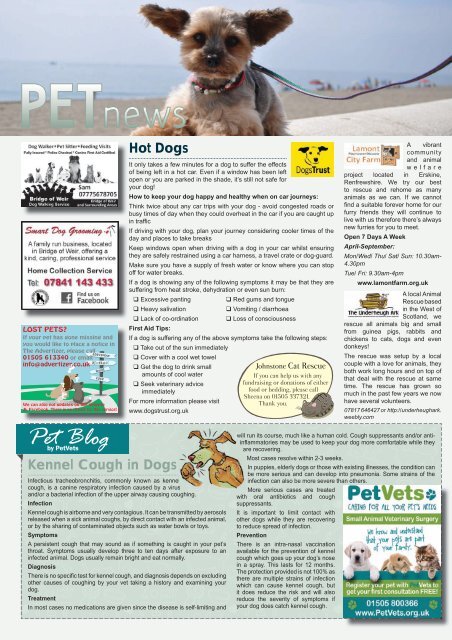274 July 2017 - Gryffe Advertizer
The Advertizer - Your local community magazine to the Gryffe area.
The Advertizer - Your local community magazine to the Gryffe area.
Create successful ePaper yourself
Turn your PDF publications into a flip-book with our unique Google optimized e-Paper software.
38 the advertizer t: 01505 613340 07731 923970 e: info@advertizer.co.uk<br />
LOST PETS?<br />
If your pet has gone missing and<br />
you would like to place a notice in<br />
The <strong>Advertizer</strong>, please call<br />
01505 613340 or email<br />
∂∫∞€Ł@)(<br />
info@advertizer.co.uk<br />
l𧥇þÐœ<br />
ÐœðŁ<br />
lð§¥<br />
We can also put updates on our website<br />
& Facebook. There is no charge for this service!<br />
Pet Blog<br />
by PetVets<br />
Hot Dogs<br />
Kennel Cough in Dogs<br />
It only takes a few minutes for a dog to suffer the effects<br />
of being left in a hot car. Even if a window has been left<br />
open or you are parked in the shade, it’s still not safe for<br />
your dog!<br />
How to keep your dog happy and healthy when on car journeys:<br />
Think twice about any car trips with your dog - avoid congested roads or<br />
busy times of day when they could overheat in the car if you are caught up<br />
in traffic<br />
If driving with your dog, plan your journey considering cooler times of the<br />
day and places to take breaks<br />
Keep windows open when driving with a dog in your car whilst ensuring<br />
they are safely restrained using a car harness, a travel crate or dog-guard.<br />
Make sure you have a supply of fresh water or know where you can stop<br />
off for water breaks.<br />
If a dog is showing any of the following symptoms it may be that they are<br />
suffering from heat stroke, dehydration or even sun burn:<br />
Excessive panting<br />
Red gums and tongue<br />
Heavy salivation<br />
Vomiting / diarrhoea<br />
Lack of co-ordination Loss of consciousness<br />
First Aid Tips:<br />
If a dog is suffering any of the above symptoms take the following steps:<br />
Take out of the sun immediately<br />
Cover with a cool wet towel<br />
Get the dog to drink small<br />
amounts of cool water<br />
Seek veterinary advice<br />
immediately<br />
For more information please visit<br />
www.dogstrust.org.uk<br />
Infectious tracheobronchitis, commonly known as kennel<br />
cough, is a canine respiratory infection caused by a virus<br />
and/or a bacterial infection of the upper airway causing coughing.<br />
Infection<br />
Kennel cough is airborne and very contagious. It can be transmitted by aerosols<br />
released when a sick animal coughs, by direct contact with an infected animal,<br />
or by the sharing of contaminated objects such as water bowls or toys.<br />
Symptoms<br />
A persistent cough that may sound as if something is caught in your pet’s<br />
throat. Symptoms usually develop three to ten days after exposure to an<br />
infected animal. Dogs usually remain bright and eat normally.<br />
Diagnosis<br />
There is no specific test for kennel cough, and diagnosis depends on excluding<br />
other causes of coughing by your vet taking a history and examining your<br />
dog.<br />
Treatment<br />
In most cases no medications are given since the disease is self-limiting and<br />
Johnstone Cat Rescue<br />
If you can help us with any<br />
fundraising or donations of either<br />
food or bedding, please call<br />
Sheena on 01505 337321.<br />
Thank you.<br />
A vibrant<br />
community<br />
and animal<br />
welfare<br />
project located in Erskine,<br />
Renfrewshire. We try our best<br />
to rescue and rehome as many<br />
animals as we can. If we cannot<br />
find a suitable forever home for our<br />
furry friends they will continue to<br />
live with us therefore there’s always<br />
new furries for you to meet.<br />
Open 7 Days A Week<br />
April-September:<br />
Mon/Wed/ Thu/ Sat/ Sun: 10.30am-<br />
4.30pm<br />
Tue/ Fri: 9.30am-4pm<br />
www.lamontfarm.org.uk<br />
A local Animal<br />
Rescue based<br />
in the West of<br />
Scotland, we<br />
rescue all animals big and small<br />
from guinea pigs, rabbits and<br />
chickens to cats, dogs and even<br />
donkeys!<br />
The rescue was setup by a local<br />
couple with a love for animals, they<br />
both work long hours and on top of<br />
that deal with the rescue at same<br />
time. The rescue has grown so<br />
much in the past few years we now<br />
have several volunteers.<br />
07817 646427 or http://underheughark.<br />
weebly.com<br />
will run its course, much like a human cold. Cough suppressants and/or anti-<br />
inflammatories may be used to keep your dog more comfortable while they<br />
are recovering.<br />
Most cases resolve within 2-3 weeks.<br />
In puppies, elderly dogs or those with existing illnesses, the condition can<br />
be more serious and can develop into pneumonia. Some strains of the<br />
infection can also be more severe than others.<br />
More serious cases are treated<br />
with oral antibiotics and cough<br />
suppressants.<br />
It is important to limit contact with<br />
other dogs while they are recovering<br />
to reduce spread of infection.<br />
Prevention<br />
There is an intra-nasal vaccination<br />
available for the prevention of kennel<br />
cough which goes up your dog’s nose<br />
in a spray. This lasts for 12 months.<br />
The protection provided is not 100% as<br />
there are multiple strains of infection<br />
which can cause kennel cough, but<br />
it does reduce the risk and will also<br />
reduce the severity of symptoms if<br />
your dog does catch kennel cough.


















